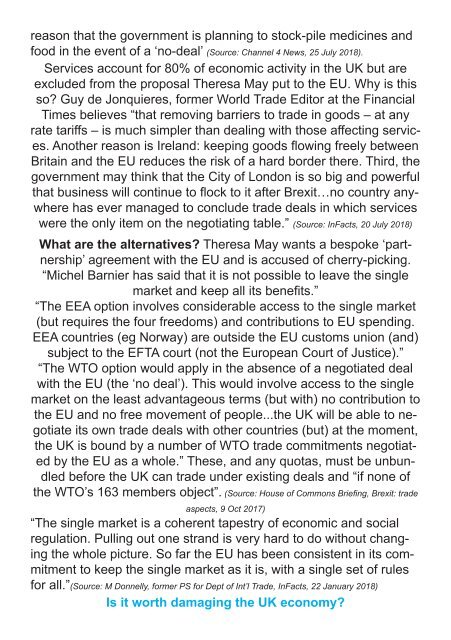24 Reasons to Remain
You also want an ePaper? Increase the reach of your titles
YUMPU automatically turns print PDFs into web optimized ePapers that Google loves.
eason that the government is planning <strong>to</strong> s<strong>to</strong>ck-pile medicines and<br />
food in the event of a ‘no-deal’ (Source: Channel 4 News, 25 July 2018).<br />
Services account for 80% of economic activity in the UK but are<br />
excluded from the proposal Theresa May put <strong>to</strong> the EU. Why is this<br />
so? Guy de Jonquieres, former World Trade Edi<strong>to</strong>r at the Financial<br />
Times believes “that removing barriers <strong>to</strong> trade in goods – at any<br />
rate tariffs – is much simpler than dealing with those affecting services.<br />
Another reason is Ireland: keeping goods flowing freely between<br />
Britain and the EU reduces the risk of a hard border there. Third, the<br />
government may think that the City of London is so big and powerful<br />
that business will continue <strong>to</strong> flock <strong>to</strong> it after Brexit…no country anywhere<br />
has ever managed <strong>to</strong> conclude trade deals in which services<br />
were the only item on the negotiating table.” (Source: InFacts, 20 July 2018)<br />
What are the alternatives? Theresa May wants a bespoke ‘partnership’<br />
agreement with the EU and is accused of cherry-picking.<br />
“Michel Barnier has said that it is not possible <strong>to</strong> leave the single<br />
market and keep all its benefits.”<br />
“The EEA option involves considerable access <strong>to</strong> the single market<br />
(but requires the four freedoms) and contributions <strong>to</strong> EU spending.<br />
EEA countries (eg Norway) are outside the EU cus<strong>to</strong>ms union (and)<br />
subject <strong>to</strong> the EFTA court (not the European Court of Justice).”<br />
“The WTO option would apply in the absence of a negotiated deal<br />
with the EU (the ‘no deal’). This would involve access <strong>to</strong> the single<br />
market on the least advantageous terms (but with) no contribution <strong>to</strong><br />
the EU and no free movement of people...the UK will be able <strong>to</strong> negotiate<br />
its own trade deals with other countries (but) at the moment,<br />
the UK is bound by a number of WTO trade commitments negotiated<br />
by the EU as a whole.” These, and any quotas, must be unbundled<br />
before the UK can trade under existing deals and “if none of<br />
the WTO’s 163 members object”. (Source: House of Commons Briefing, Brexit: trade<br />
aspects, 9 Oct 2017)<br />
“The single market is a coherent tapestry of economic and social<br />
regulation. Pulling out one strand is very hard <strong>to</strong> do without changing<br />
the whole picture. So far the EU has been consistent in its commitment<br />
<strong>to</strong> keep the single market as it is, with a single set of rules<br />
for all.”(Source: M Donnelly, former PS for Dept of Int’l Trade, InFacts, 22 January 2018)<br />
Is it worth damaging the UK economy?


